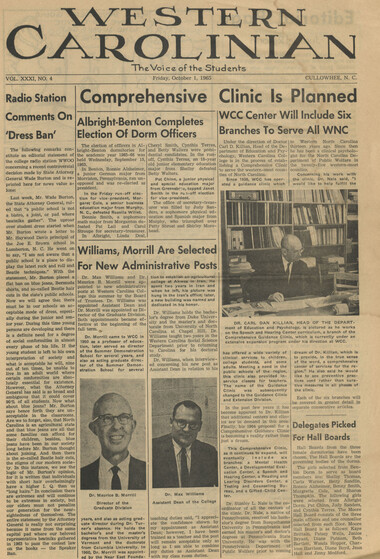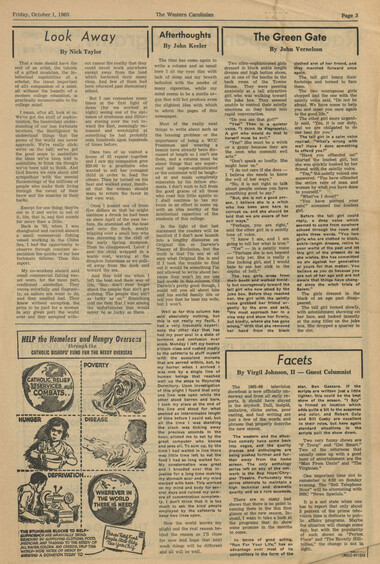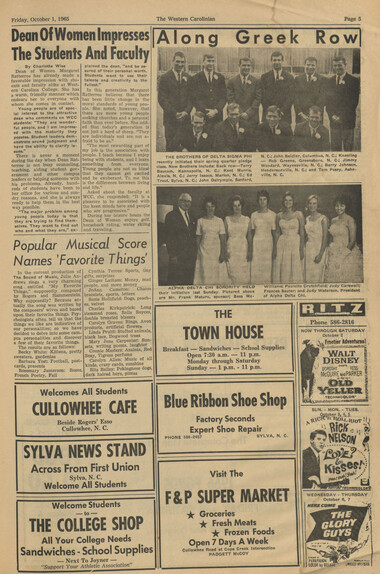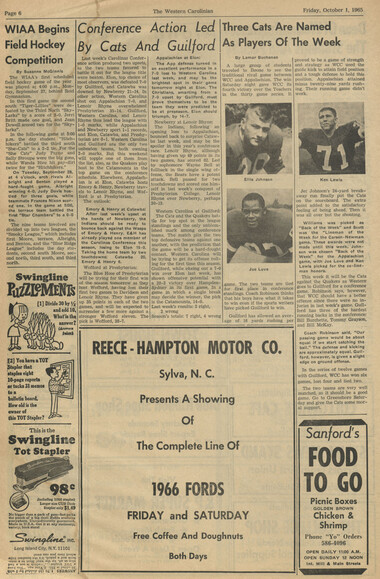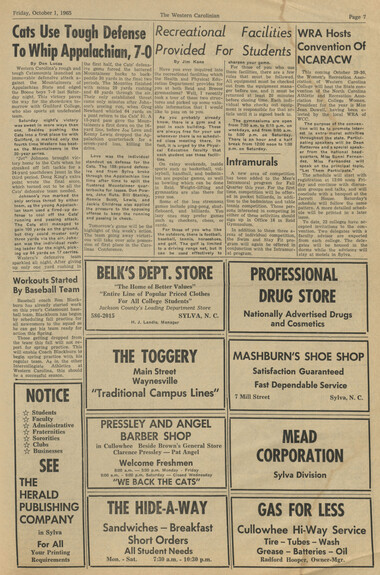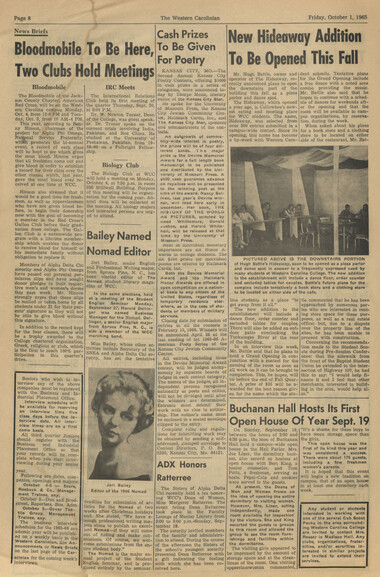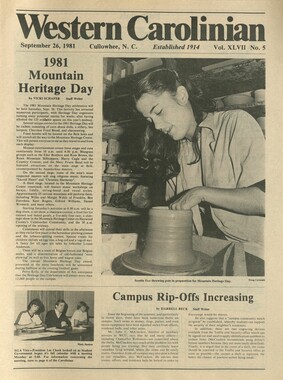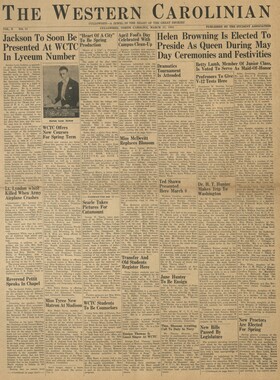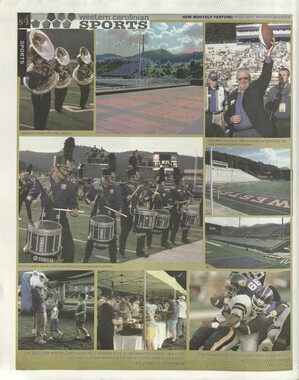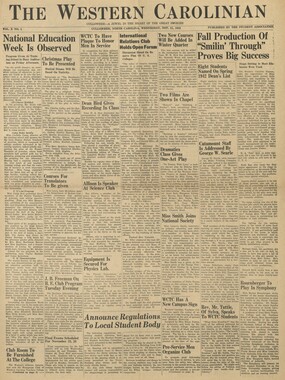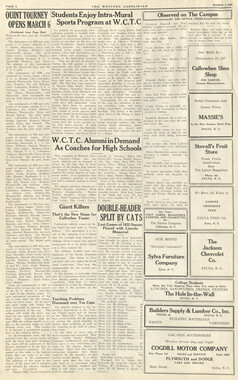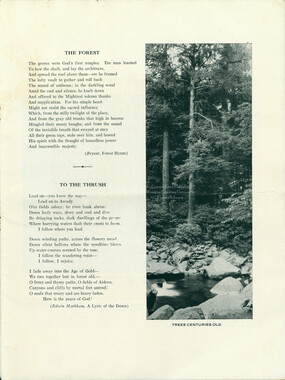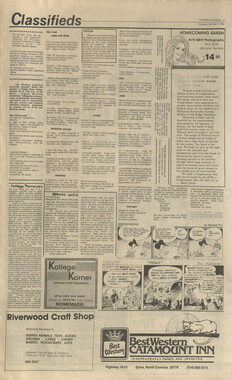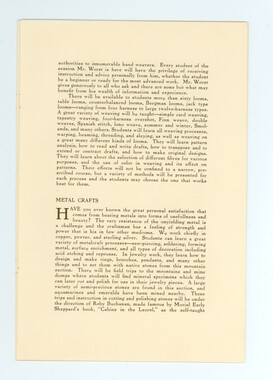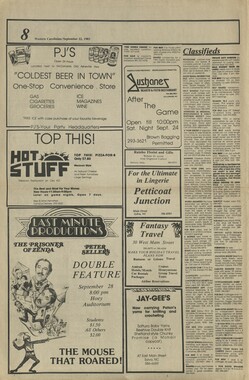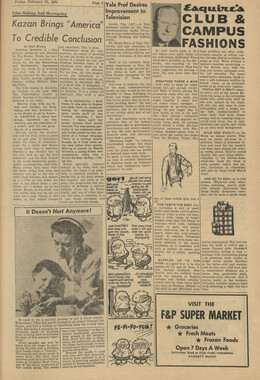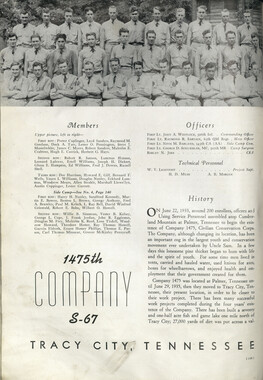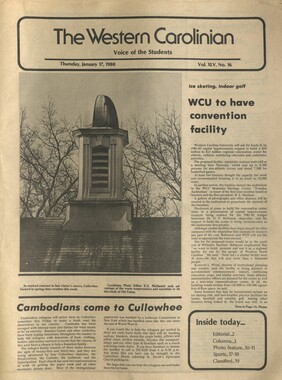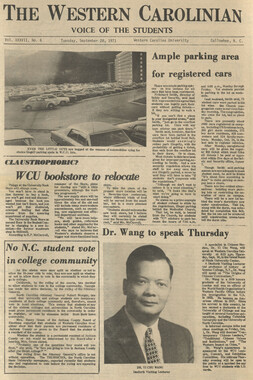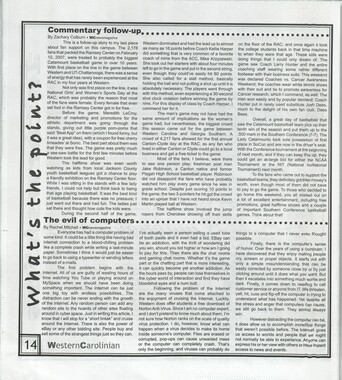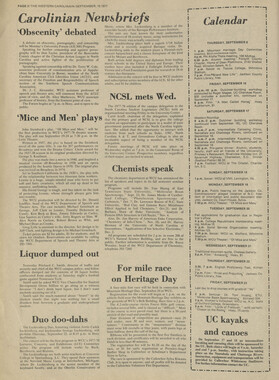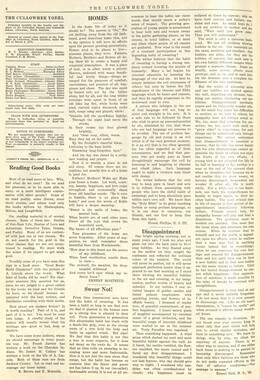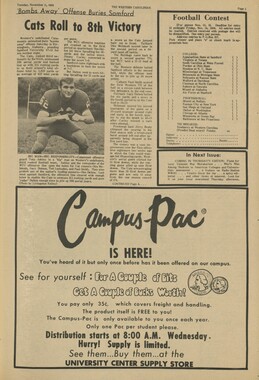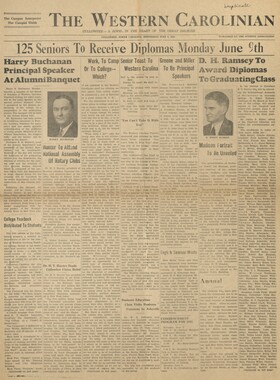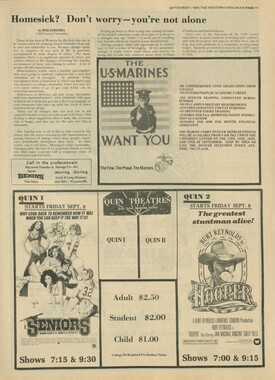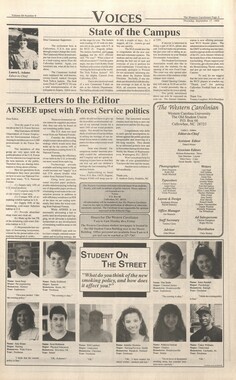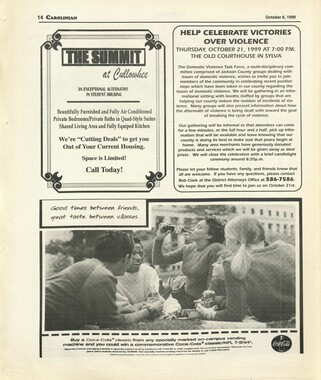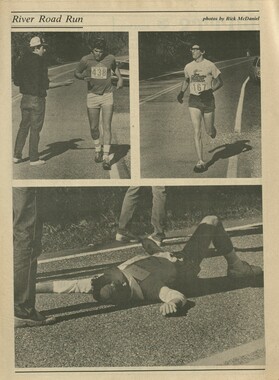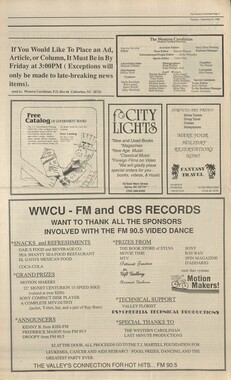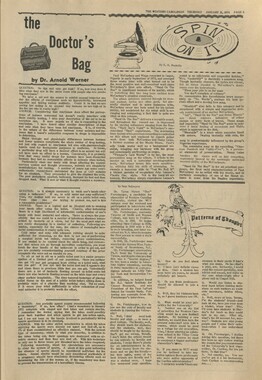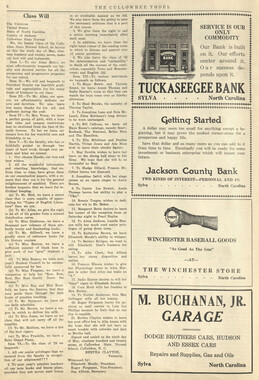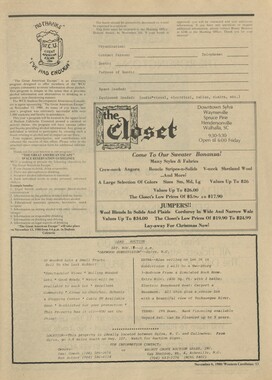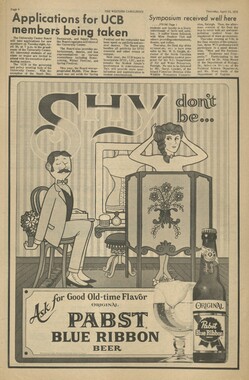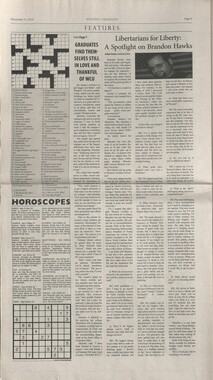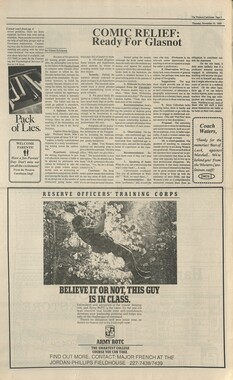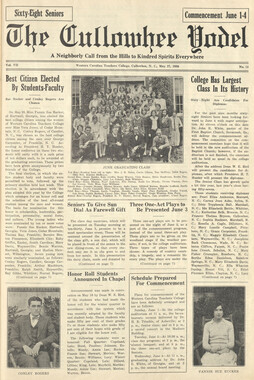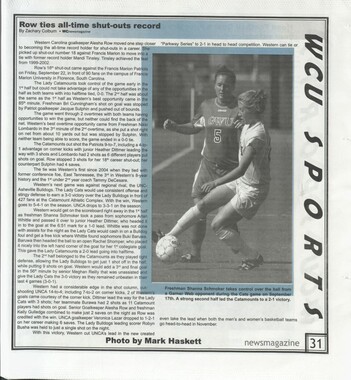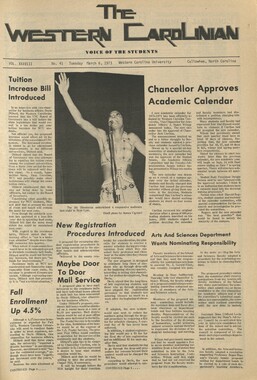Western Carolina University (20)
View all
- Canton Champion Fibre Company (2308)
- Cherokee Traditions (291)
- Civil War in Southern Appalachia (165)
- Craft Revival (1942)
- Great Smoky Mountains - A Park for America (2946)
- Highlights from Western Carolina University (430)
- Horace Kephart (941)
- Journeys Through Jackson (159)
- LGBTQIA+ Archive of Jackson County (85)
- Oral Histories of Western North Carolina (314)
- Picturing Appalachia (6798)
- Stories of Mountain Folk (413)
- Travel Western North Carolina (160)
- Western Carolina University Fine Art Museum Vitreograph Collection (129)
- Western Carolina University Herbarium (92)
- Western Carolina University: Making Memories (708)
- Western Carolina University Publications (2412)
- Western Carolina University Restricted Electronic Theses and Dissertations (146)
- Western North Carolina Regional Maps (71)
- World War II in Southern Appalachia (131)
University of North Carolina Asheville (6)
View all
- Allanstand Cottage Industries (62)
- Appalachian National Park Association (53)
- Bennett, Kelly, 1890-1974 (1388)
- Berry, Walter (76)
- Brasstown Carvers (40)
- Carver, George Washington, 1864?-1943 (26)
- Cathey, Joseph, 1803-1874 (1)
- Champion Fibre Company (233)
- Champion Paper and Fibre Company (297)
- Cherokee Indian Fair Association (16)
- Cherokee Language Program (22)
- Crowe, Amanda (40)
- Edmonston, Thomas Benton, 1842-1907 (7)
- Ensley, A. L. (Abraham Lincoln), 1865-1948 (275)
- Fromer, Irving Rhodes, 1913-1994 (70)
- George Butz (BFS 1907) (46)
- Goodrich, Frances Louisa (120)
- Grant, George Alexander, 1891-1964 (96)
- Heard, Marian Gladys (60)
- Kephart, Calvin, 1883-1969 (15)
- Kephart, Horace, 1862-1931 (313)
- Kephart, Laura, 1862-1954 (39)
- Laney, Gideon Thomas, 1889-1976 (439)
- Masa, George, 1881-1933 (61)
- McElhinney, William Julian, 1896-1953 (44)
- Niggli, Josephina, 1910-1983 (10)
- North Carolina Park Commission (105)
- Osborne, Kezia Stradley (9)
- Owens, Samuel Robert, 1918-1995 (11)
- Penland Weavers and Potters (36)
- Roberts, Vivienne (15)
- Roth, Albert, 1890-1974 (142)
- Schenck, Carl Alwin, 1868-1955 (1)
- Sherrill's Photography Studio (2565)
- Southern Highland Handicraft Guild (127)
- Southern Highlanders, Inc. (71)
- Stalcup, Jesse Bryson (46)
- Stearns, I. K. (213)
- Thompson, James Edward, 1880-1976 (226)
- United States. Indian Arts and Crafts Board (130)
- USFS (683)
- Vance, Zebulon Baird, 1830-1894 (1)
- Weaver, Zebulon, 1872-1948 (58)
- Western Carolina College (230)
- Western Carolina Teachers College (282)
- Western Carolina University (1899)
- Western Carolina University. Mountain Heritage Center (18)
- Whitman, Walt, 1819-1892 (10)
- Wilburn, Hiram Coleman, 1880-1967 (73)
- Williams, Isadora (3)
- Cain, Doreyl Ammons (0)
- Crittenden, Lorraine (0)
- Rhodes, Judy (0)
- Smith, Edward Clark (0)
- Appalachian Region, Southern (2569)
- Asheville (N.C.) (1923)
- Avery County (N.C.) (26)
- Blount County (Tenn.) (195)
- Buncombe County (N.C.) (1672)
- Cherokee County (N.C.) (283)
- Clay County (N.C.) (555)
- Graham County (N.C.) (233)
- Great Smoky Mountains National Park (N.C. and Tenn.) (519)
- Haywood County (N.C.) (3569)
- Henderson County (N.C.) (70)
- Jackson County (N.C.) (4804)
- Knox County (Tenn.) (35)
- Knoxville (Tenn.) (13)
- Lake Santeetlah (N.C.) (10)
- Macon County (N.C.) (420)
- Madison County (N.C.) (215)
- McDowell County (N.C.) (39)
- Mitchell County (N.C.) (132)
- Polk County (N.C.) (35)
- Qualla Boundary (981)
- Rutherford County (N.C.) (76)
- Swain County (N.C.) (2135)
- Transylvania County (N.C.) (270)
- Watauga County (N.C.) (12)
- Waynesville (N.C.) (86)
- Yancey County (N.C.) (72)
- Aerial Photographs (3)
- Aerial Views (60)
- Albums (books) (4)
- Articles (1)
- Artifacts (object Genre) (228)
- Bibliographies (1)
- Biography (general Genre) (2)
- Cards (information Artifacts) (38)
- Clippings (information Artifacts) (191)
- Copybooks (instructional Materials) (3)
- Crafts (art Genres) (622)
- Depictions (visual Works) (21)
- Design Drawings (1)
- Drawings (visual Works) (185)
- Envelopes (73)
- Exhibitions (events) (1)
- Facsimiles (reproductions) (1)
- Fiction (general Genre) (4)
- Financial Records (12)
- Fliers (printed Matter) (67)
- Glass Plate Negatives (381)
- Guidebooks (2)
- Internegatives (10)
- Interviews (815)
- Land Surveys (102)
- Letters (correspondence) (1013)
- Manuscripts (documents) (618)
- Maps (documents) (177)
- Memorandums (25)
- Minutes (administrative Records) (59)
- Negatives (photographs) (6015)
- Newsletters (1290)
- Newspapers (2)
- Notebooks (8)
- Occupation Currency (1)
- Paintings (visual Works) (1)
- Pen And Ink Drawings (1)
- Periodicals (193)
- Personal Narratives (10)
- Photographs (12976)
- Plans (maps) (1)
- Poetry (5)
- Portraits (4539)
- Postcards (329)
- Programs (documents) (151)
- Publications (documents) (2364)
- Questionnaires (65)
- Relief Prints (26)
- Sayings (literary Genre) (1)
- Scrapbooks (282)
- Sheet Music (2)
- Slides (photographs) (402)
- Songs (musical Compositions) (2)
- Sound Recordings (796)
- Specimens (92)
- Speeches (documents) (15)
- Tintypes (photographs) (8)
- Transcripts (322)
- Video Recordings (physical Artifacts) (23)
- Text Messages (0)
- A.L. Ensley Collection (275)
- Appalachian Industrial School Records (7)
- Appalachian National Park Association Records (336)
- Axley-Meroney Collection (2)
- Bayard Wootten Photograph Collection (20)
- Bethel Rural Community Organization Collection (7)
- Blumer Collection (5)
- C.W. Slagle Collection (20)
- Canton Area Historical Museum (2110)
- Carlos C. Campbell Collection (462)
- Cataloochee History Project (64)
- Cherokee Studies Collection (4)
- Daisy Dame Photograph Album (5)
- Daniel Boone VI Collection (1)
- Doris Ulmann Photograph Collection (112)
- Elizabeth H. Lasley Collection (1)
- Elizabeth Woolworth Szold Fleharty Collection (4)
- Frank Fry Collection (95)
- George Masa Collection (173)
- Gideon Laney Collection (452)
- Hazel Scarborough Collection (2)
- Hiram C. Wilburn Papers (28)
- Historic Photographs Collection (236)
- Horace Kephart Collection (861)
- Humbard Collection (33)
- Hunter and Weaver Families Collection (1)
- I. D. Blumenthal Collection (4)
- Isadora Williams Collection (4)
- Jesse Bryson Stalcup Collection (47)
- Jim Thompson Collection (224)
- John B. Battle Collection (7)
- John C. Campbell Folk School Records (80)
- John Parris Collection (6)
- Judaculla Rock project (2)
- Kelly Bennett Collection (1407)
- Love Family Papers (11)
- Major Wiley Parris Civil War Letters (3)
- Map Collection (12)
- McFee-Misemer Civil War Letters (34)
- Mountain Heritage Center Collection (4)
- Norburn - Robertson - Thomson Families Collection (44)
- Pauline Hood Collection (7)
- Pre-Guild Collection (2)
- Qualla Arts and Crafts Mutual Collection (12)
- R.A. Romanes Collection (681)
- Rosser H. Taylor Collection (1)
- Samuel Robert Owens Collection (94)
- Sara Madison Collection (144)
- Sherrill Studio Photo Collection (2558)
- Smoky Mountains Hiking Club Collection (616)
- Stories of Mountain Folk - Radio Programs (374)
- The Reporter, Western Carolina University (510)
- Venoy and Elizabeth Reed Collection (16)
- WCU Gender and Sexuality Oral History Project (32)
- WCU Mountain Heritage Center Oral Histories (25)
- WCU Oral History Collection - Mountain People, Mountain Lives (71)
- WCU Students Newspapers Collection (1843)
- Western North Carolina Tomorrow Black Oral History Project (69)
- William Williams Stringfield Collection (2)
- Zebulon Weaver Collection (109)
- African Americans (390)
- Appalachian Trail (35)
- Artisans (521)
- Cherokee art (84)
- Cherokee artists -- North Carolina (10)
- Cherokee language (21)
- Cherokee pottery (101)
- Cherokee women (208)
- Church buildings (172)
- Civilian Conservation Corps (U.S.) (111)
- College student newspapers and periodicals (1933)
- Dams (107)
- Dance (1023)
- Education (222)
- Floods (61)
- Folk music (1015)
- Forced removal, 1813-1903 (2)
- Forest conservation (220)
- Forests and forestry (1184)
- Gender nonconformity (4)
- Great Smoky Mountains National Park (N.C. and Tenn.) (181)
- Hunting (45)
- Landscape photography (25)
- Logging (119)
- Maps (83)
- Mines and mineral resources (8)
- North Carolina -- Maps (18)
- Paper industry (38)
- Postcards (255)
- Pottery (135)
- Railroad trains (72)
- Rural electrification -- North Carolina, Western (3)
- School integration -- Southern States (2)
- Segregation -- North Carolina, Western (5)
- Slavery (5)
- Sports (452)
- Storytelling (243)
- Waterfalls -- Great Smoky Mountains (N.C. and Tenn.) (66)
- Weaving -- Appalachian Region, Southern (280)
- Wood-carving -- Appalachian Region, Southern (328)
- World War, 1939-1945 (173)
Western Carolinian Volume 31 Number 04
Item
Item’s are ‘child’ level descriptions to ‘parent’ objects, (e.g. one page of a whole book).
-
-
WESTERN Carol i n ian fhe.Voice of the Students VOL. XXXI, NO. 4 Friday, October 1, 1965 CULLOWHEE, N. C. Radio Station Comments On 'Dress Ban' The following remarks constitute an editorial statement of the college radio station WWOO concerning a recent controversial decision made by State Attorney General Wade Burton and is reprinted here for news value a- lone: Last week, Mr. Wade Burton, the State Attorney General, ruled that "a public school is not a bistro, a joint, or pad where beatniks gather". The uproar over student dress started when Mr. Burton wrote a letter to Mr. Haywood Davis principal of the Joe E. Brown school in Lumberton, N. C. He went on to say, "I am not aware that a public school is a place to display the latest rock and roll and Beatle techniques." With the statement, Mr. Burton placed a flat ban on blue jeans, Bermuda shorts, and so-called Beatle hair cuts in the state's public schools. Now we will agree that there must be in our schools an acceptable mode of dress, especially during the junior and senior year. During this time young persons are developing and there is a definite need for a degree of social conformities in almost every phase of his life. If the young student is left to his own interpretation of society and what is acceptable he will, nine out of ten times, be unable to live in an adult world where certain conformities are absolutely essential for existence. However, what the Attorney General has said is so broad and ambiguous that it could cover 90% of all students. Now what about blue jeans? Mr. Burton says hence forth they are unacceptable in the classrooms. Are we to forget, also, that North Carolina is an agricultural state and that blue jeans are all that some families can afford for their children, besides, blue jeans have been in our society long before Mr. Burton thought about joining. And then there is the so-called Beatle hair cuts, the stigma of our modern society. In this instance, we see the logic of Mr. Burton's opinion, for it is written that individuals with short hair overhelmingly have a higher I. Q. than us "long hairs." In conclusion there are extremes and will continue to be extremes in society, but our elders must not penalize our generation for the nearsightedness of themselves. The entire statement by the Attorney General is really not surprising because it came from the same capital pad where our beloved representative beatniks gathered in 1963 to pass the coolest law on the books — the Speaker Ban. Comprehensive Clinic Is Planned Albright-Benton Completes Election Of Dorm Officers The election of officers in Albright-Benton dormitories for the academic year 1965-66 was held Wednesday, September 15, 1965. In Benton, Ronnie Alzheimer, a junior German major from Morriston, Pennsylvania, ran unopposed and was re-elected as president. In the Friday run-off election for vice-president, Margaret Cole, a senior business education major from Murphy, N. C, defeated Rozella Willet. Bennie Smith, a sophomore math major from Morganton defeated Pat Lail and Carol Stroupe for secretary-treasurer. In Albright, Linda Deal, Cheryl Smith, Cynthia Terres, and Betty Walters were presidential candidates. In the runoff, Cynthia Terres, an 18-year old junior elementary education major from Shelby defeated Betty Walters. Pat Chinn, a Junior physical and special education major from Greensbrvo, topped Janet Smith in the ru.i-off election for vice-president. The office of secretary-treasurer was filled by Judy Sanders, a sophomore physical education and Spanish major from Murphy, who triumphed over Patty Shroat and Shirley More- head. Williams, Morrill Are Selected For New Administrative Posts WCC Center Will Include Six Branches To Serve All WNC Under the direction of Doctor Carl D. Killian, Head of the Department of Education and Psychology, Western Carolina College is in the process of establishing a Comprehensive Clinic to serve the western-most counties of North Carolina. Since 1938, WCC has operated a guidance clinic which to Western North Carolina thirteen years ago. Since then he has been a clinical psychologist for the North Carolina Department ot Public Welfare in the twenty-five western-most counties. Concerning his work with the clinic, Dr. Nale said, "I would like to help fulfill the Dr. Max Williams and Dr. Maurice B. Morrill were appointed to new administrative posts at Western Carolina College this summer by the Board of Trustees. Dr. Williams was appointed Assistant Dean and Dr. Morrill was appointed as Director of the Graduate Division. Both appointments became effective at the beginning of the fall term. _ Dr. Morrill came to WCC in 1950 as a professor of education, later served as director of the Summer Demonstration School for several years, and also as acting graduate director of the Summer Demonstration School for several tion to establish an agricultural college at Akwoz in Iran. He spent two years in Iran and when he left, his picture was hung in the Iran's office; later, a new building was named and dedicated in his honor. Dr. Williams holds the bachelor's degree from Duke University and the master's and doctorate from University of North Carolina at Chapel Hill. Dr. Williams taught two years in the Western Carolina Social Science Department prior to returning to Carolina for his doctoral study. Dr. Williams, when interviewed concerning his new post as Assistant Dean in relation to his DR. CARL DAN KILLIAN, HEAD OF THE DEPART- ment of Education and Psychology, is pictured as he works on the Speech and Hearing Center curriculum, a branch of the Comprehensive Guidance Clinic, which is currently under an extensive expansion program under his direction at WCC. Dr. Maurice B. Morrill Director of the Graduate Division years, and also as acting graduate director during Dr. Turner's absence. He holds the bachelor's and the master's degrees from the University of Vermont and the doctorate from Columbia University. In 1960, Dr. Morrill was appointed by the Near East Founda- Dr. Max Williams Assistant Dean of the College teaching duties said, "I appreciate the confidence shown by my appointment as Assistant Dean; however, I have been trained as a teacher and the post will remain acceptable only as long as I am able to combine my duties as Assistant Dean with my class room duties. has offered a wide variety of clinical services to children, college students, and some adults. Meeting a need in the public schools of the region, this clinic also provided in- service classes for teachers. The name of the Guidance Clinic was subsequently changed to the Guidance Clinic and Extension Division. In the past few years it has become apparent to Dr. Killian that additional centers and clinics are in demand in this area. Finally, his 1964 proposal for a Comprehensive Guidance Clinic is becoming a reality rather than just a dream. This Comprehensive Clinic, as it continues to expand, will eventually include six branches: a Mental Health Center, a Developmental Evaluation Center, a Speech and Hearing Center, a Reading and Learing Disorders Center, a Testing and Counseling Bureau, and a Gifted-Child Center. Dr. Stanley L. Nale is the coordinator of all the centers of the clinic. Dr. Nale, a native of Pennsylvania, received his bachelor's degree from Susquehanna University in Pennsylvania and earned his master's and doctor's degrees at Pennsylvania State University. He was with the Pennsylvania Department of Public Welfare prior to coming dream of Dr. Killian, which is to provide, in the true sense of the word, a comprehensive center of services for the region." He also said he would like to see preventive practices used rather than curative measures in all phases of the clinic. Each of the six branches will be covered in greater detail in separate consecutive articles. Delegates Picked For Hall Boards Hall Boards from the three female dormitories have been chosen. The Hall Boards are the governing bodies of the dorms. The girls selected from Benton Dorm to serve as board members are: Shelby Thomas, Carla Warner, Betty Sandlin, Ronnie Alzheimer, Benny Smith, Margrette Cole, and Sharon Thompkin. The following girls were selected from Albright Dorm: Pat Chinn, Judy Sanders, and Cynthia Terres. The Moore Hall Board consists of the three main officers and one counsellor selected from each floor. Moore Hall Board is as follows: Kaye Brittain, Patsey Wells, Janice Bryant, Diane Putnam, Beth Bartlett, Wanda Hopper, Char- lene Harrison, Diane Boyd, Jean Hall and Jinny Medford.
Object
Object’s are ‘parent’ level descriptions to ‘children’ items, (e.g. a book with pages).
-
The Western Carolinian is Western Carolina University’s student-run newspaper. The paper was published as the Cullowhee Yodel from 1924 to 1931 before changing its name to The Western Carolinian in 1933.
-
